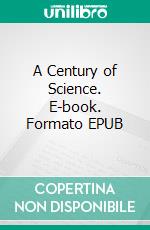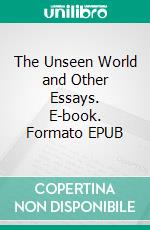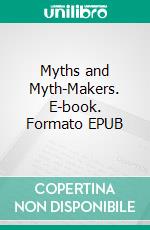John Fiske eBooks
eBooks di John Fiske di Formato Epub
A Century of Science. E-book. Formato EPUB John Fiske - Endymion Press, 2016 -
In the course of the year 1774 Dr. Priestley found that by heating red precipitate, or what we now call red oxide of mercury, a gas was obtained, which he called "dephlogisticated air," or, in other words, air deprived of phlogiston, and therefore incombustible. This incombustible air was oxygen, and such was man's first introduction to the mighty element that makes one fifth of the atmosphere in volume and eight ninths of the ocean by weight, besides forming one half of the earth's solid crust, and supporting all fire and all life. I know of nothing which can reveal to us with such startling vividness the extent of the gulf which the human mind has traversed within little more than a hundred years. It is scarcely possible to put ourselves back into the frame of mind in which oxygen was unknown, and no man could tell what takes place when a log of wood is burned on the hearth. The language employed by Dr. Priestley carries us back to the time when chemistry was beginning to emerge from alchemy. It was Newton's contemporary, Stahl, who invented the doctrine of phlogiston in order to account for combustion. Stahl supposed that all combustible substances contain a common element, or fire principle, which he called phlogiston, and which escapes in the process of combustion. Indeed, the act of combustion was supposed to consist in the escape of phlogiston. Whither this mysterious fire principle betook itself, after severing its connection with visible matter, was not too clearly indicated, but of course it was to that limbo far larger than purgatory, the oubliette wherein have perished men's unsuccessful guesses at truth. Stahl's theory, however, marked a great advance upon what had gone before, inasmuch as it stated the case in such a way as to admit of direct refutation. Little use was made of the balance in those days, but when it was observed that zinc and lead and sundry other substances grow heavier in burning, it seemed hardly correct to suppose that anything had escaped from these substances. To this objection the friends of the fire principle replied that phlogiston might weigh less than nothing, or, in other words, might be endowed with a positive attribute of levity, so that to subtract it from a body would increase the weight of the body. This was a truly shifty method of reasoning, in which your phlogiston, with its plus sign to-day and its minus sign to-morrow, exhibited a skill in facing both ways like that of an American candidate for public office...
The Unseen World and Other Essays. E-book. Formato EPUB John Fiske - Passerino, 2024 -
John Fiske (March 30, 1842 – July 4, 1901) was an American philosopher and historian. He was heavily influenced by Herbert Spencer and applied Spencer's concepts of evolution to his own writings on linguistics, philosophy, religion, and history.Essays in this book include: The Unseen World; The To-Morrow Of Death; The Jesus Of History; The Christ Of Dogma; A Word About Miracles; Draper On Science And Religion; Nathan The Wise; Historical Difficulties; The Famine Of 1770 In Bengal; Spain And The Netherlands; Longfellow’s Dante; Paine’s St. Peter; A Philosophy Of Art; and, Athenian And American Life.
Myths and Myth-Makers. E-book. Formato EPUB John Fiske - Books On Demand, 2019 -
IN publishing this somewhat rambling and unsystematic series of papers, in which I have endeavoured to touch briefly upon a great many of the most important points in the study of mythology, I think it right to observe that, in order to avoid confusing the reader with intricate discussions, I have sometimes cut the matter short, expressing myself with dogmatic definiteness where a sceptical vagueness might perhaps have seemed more becoming. In treating of popular legends and superstitions, the paths of inquiry are circuitous enough, and seldom can we reach a satisfactory conclusion until we have travelled all the way around Robin Hood's barn and back again. I am sure that the reader would not have thanked me for obstructing these crooked lanes with the thorns and brambles of philological and antiquarian discussion, to such an extent as perhaps to make him despair of ever reaching the high road. I have not attempted to review, otherwise than incidentally, the works of Grimm, Muller, Kuhn, Breal, Dasent, and Tylor; nor can I pretend to have added anything of consequence, save now and then some bit of explanatory comment, to the results obtained by the labour of these scholars; but it has rather been my aim to present these results in such a way as to awaken general interest in them.


